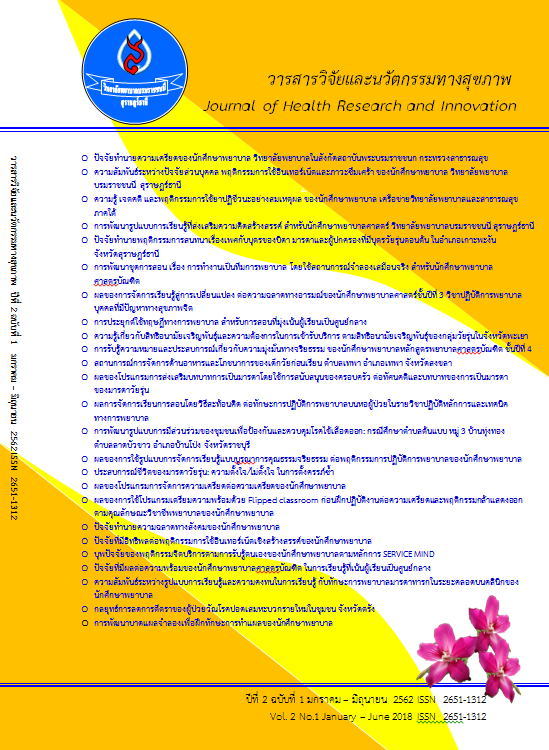Effects of using Integrated learning management with ethics on nursing behavior of nursing students
Keywords:
The integrated learning management model with ethics, nursing practice behaviorAbstract
This research design was Quasi - experimental research and manipulated as time series design. It was to study the effects of using integrated learning management model with ethics on nursing behavior of nursing students. The random selection was purposive sampling, included 30 nursing students that studied in 2nd and 3rd year at Boromarajonani college of nursing, Nonthaburi Province who learned in the subjects of nursing practice with researcher and co researcher. The learning management model was composed of 4 principles, as follows: (1) preparation for learning; (2) to enhance the ethical decision; (3) self efficacy for learning motivation; and (4) learning in real life situations. The learning management plan was composed of activities as follows: (1) preparation for nursing practice; and (2) nursing practice based on ethics which composed of two activities, as follows : 1) enhancing the ability for nursing practice based on nursing standard; and enhancing the ethical in nursing practice. The learning process was run continuously with 4 steps, as follows: 1) Plan; 2) action; 3) evaluation, and 4) reflection
The research results were found that the nursing practice behavior of nursing students in terms of an overview and each factors were higher at a statistically significant rate (p=.05), and their development had also improved.
References
Chowning, Jeanne Ting; et.al. (2012). Fostering Critical Thinking, Reasoning, and Argumentation Skills through Bioethics Education. PLoS ONE. 7(5): 1-8. Retrieved July 10, 2015, from https://doi: 10.1371/journal.pone.0036791.
Chris L. S. Coryn, et.al. (2009). Adding a Time-Series Design Element to the Success Case Method to Improve Methodological Rigor: An Application for Nonprofit Program Evaluation. American Journal of Evaluation, 30(1), 80-92. Retrieved April 10, 2015, from http://aje.sagepub.com hosted at http://online.sagepub.com.
Danulada Jamjuree; et al., (2014). The Study of the School and Community Participation in Education Management Case Study: Baan Don Sai School, Nakorn Sri Dhammaraj Province. Journal of Research and Curriculum Development, 4(1), 31-45. (in Thai)
Khaomala, J,. (2018). Development of a Learning Management Model to Enhance the Civic Professionalism Attributes of Nursing Students. Unpublished Doctoral’ Dissertation, Srinakharinwirot University. (in Thai)
Kholberg, Lawrence. (1976). Moral Stages and Moralization: The Cognitive Developmental Approach. In T. Lickona (Ed.), Moral Development and Behavior: Theory, Research and Social Issues (pp.31-53). New York: Holt: Rinehart & Winston.
Khonthai Foundation. (2014). Retrieved November 10, 2014, from http://www. Khonthaifoundation.org/news-detail.php?id=47.(in Thai)Kramer, M. and Usher, A. (2011). Work-Integrated Learning and Career-Ready Students: Examining the Evidence Toronto: Higher Education Strategy Associates.
Peters, Scott J. (2004). Educating the Civic Professional: Reconfigurations and Resistances. Michigan Journal of Community Service-Learning. 11(1): 47-58.
Sullivan, William M. (2005). Work and Integrity: the Crisis and Promise of Professionalism in America. 2nd ed. San Francisco, CA: Jossey-bass.
Molieri, W,. (2007). A Development of Instructional Model Based on Lickona’s Character Education Approach for Enhancing Professional Ethics in Responsibility of Vocational and Technology Students. Unpublished Doctoral’Dissertation. Chulalongkorn University. (in Thai)
Downloads
Published
How to Cite
Issue
Section
License
Published articles are copyrighted by the Journal of Boromarajonani College of Nursing, Suratthani.
The content appearing in each article in this academic journal represents the personal opinions of the respective authors and is not affiliated with Boromarajonani College of Nursing, Suratthani, or any other faculty members of the institution. Each author bears full responsibility for all components of their respective article. In the event of any errors, each author shall be solely responsible for their own article.



